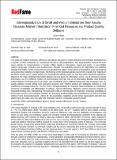| dc.description.abstract | The small and medium enterprises (SMEs) are key players towards reviving the economy and livelihood development in Tanzania, yet their involvement in international business is still unsatisfactory. This study therefore assessed the three major setbacks for industrialization of Arusha’s SMEs namely as information, finance and quality. A cross-section research design was conducted using questionnaires. Through non-probability sampling, 50 respondents were stratified selected from SMEs owners, employees, business development support organizations and regulators. Data was analysed using descriptive statistics and logit model. The findings on the existing business environment revealed that: majority of the SMEs involve women (68%) dealing with handcraft and tailoring, with less than five years of business experience. Moreover, the major identified information setbacks are low access to information source, use of irrelevancy market information, use of in effective medium of communication and high cost of the information. Besides, other financial related setbacks are limited sources of capital, lack of collateral, poor credibility history and high transaction cost. On quality setbacks include selling semi processed products, poor finished product and packaging materials as well insufficient processing machinery. Thus for SMEs internationalization the following recommendations are established: improving accessibility and affordability of relevant market information; designing various financial products at reasonable lending rates, strengthening entrepreneurial skills and formalization of enterprises; enhancing availability of processing machinery and packaging materials for improving product quality and competitiveness as well as avoiding selling of semi processed products . Above all, the government, regulators, private sector organizations and other key players along the value chain must play their respective relevant role towards supporting SMEs. | en_US |

